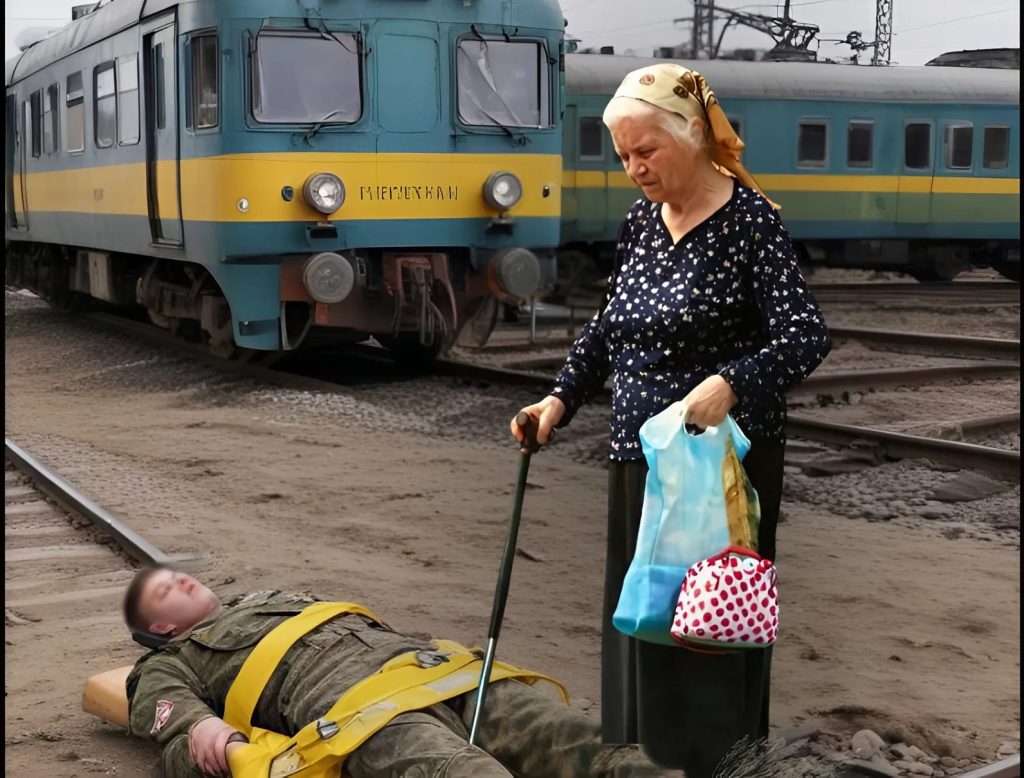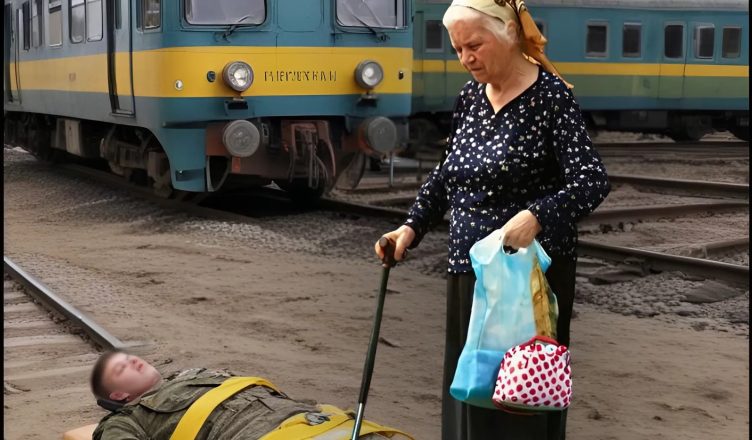The station was unusually quiet. No one shouted. No one ran. Even the routine announcements seemed to fade into the distance.
People stood in small clusters. Some with flowers. Some with cameras. Others with nothing but heavy hearts.
They were waiting for a special train. Or rather, a special carriage. One carrying a Cargo 300 — the military term for a severely wounded soldier. Alive, but broken.
He arrived in a wheelchair, pale, thin, with both legs gone and his right arm suspended in a sling.
This young man had been at the front. Now he was back — not as the boy who left home, but as someone war had rewritten entirely.
He looked straight ahead, eyes empty, mouth pressed into a line. His shoulders sagged under an invisible weight. A hero to some, a stranger to himself.
And then, among the crowd, a woman stepped forward. Plain coat. Tired face. This was his mother.
A Morning Like Any Other — Until the Phone Rang
Earlier that day, Svetlana Ivanovna was peeling potatoes. She had just loaded the laundry, prepared porridge for her daughter, and was already thinking about dinner.
She was a pensioner. Still worked as a cleaner at the local grocery store to make ends meet. Her daughter was still in school. There was never enough money, never enough hours in the day.
The phone rang.
Without even wiping her hands, she pressed the phone to her ear, knife still in the other hand.
«Yes?» she said sharply.
A man’s voice. Calm. Serious.
«Is this Svetlana Ivanovna?»
«Depends who’s asking. If you’re from the bank, I don’t need a loan. Please don’t call here again.»
«No. I’m calling about your son.»
She froze. The potato dropped into the sink.
«What happened?» she asked quietly.
«He’s alive. But injured. They’re bringing him home today.»
The Station. The Return.
She arrived early. No one asked who she was. They recognized her.
No banners. No balloons. Just her coat, a scarf around her head, and hands clasped tightly in front of her.
She waited in silence. When the train pulled in, there was no music. Just the slow, careful process of lowering stretchers and wheelchairs.
Then she saw him.
Her son. Her boy. The one she kissed goodbye before he boarded a military bus a year ago.

Now missing legs. Now in a chair. Now barely able to lift his hand in greeting.
He looked at her.
She stepped closer. Slowly. Stood in front of him. No tears. No embraces. Just two people — separated by time, by pain, by everything they couldn’t say.
She looked him in the eyes. Then bent slightly and whispered three words.
«Alive? Thank God.»
Then she turned around — and walked away.
The Crowd Stood Still
No one spoke. Not even the medics.
“Was that his mother?” someone finally asked.
“She was,” came a quiet answer.
She didn’t look back. She didn’t stumble. She simply walked — not out of rejection, not out of anger. Out of weight. Out of gravity. Because something inside her told her if she stayed one more second, she would fall apart.
The Homecoming No One Plans For
Later that day, she would make space for a bed in the kitchen. It was the only place wide enough for a wheelchair.
She wouldn’t speak about what she saw at the station. Not to neighbors. Not to friends. Not even to him.
But at night, she would sit in the hallway — holding an old photo of him in his school uniform. Two legs. Big smile. No shadows behind his eyes.
“I gave birth to him twice,” she would whisper. “Once in the hospital. And once today. Only I don’t know why.”
What Three Words Can Carry
“Alive? Thank God.”
Three simple words. Not poetry. Not comfort. But weight.
In those three words — a mother’s fear, her private prayers, her refusal to hope too soon. They were words spoken to ground herself, to remind him, and to anchor a moment too overwhelming to name.
She didn’t need to say more. She couldn’t.
Because some pain is not for words. And some love is not for show.
The Beginning of Something Else
He didn’t speak for days. He ate in silence. Slept in bursts.
Then one evening, without warning, he said,
“Do you think they’ll look at me funny when I go outside?”
She didn’t ask what he meant by “they.” Or what he feared.
Instead, she said,
“You’re alive. That’s enough. We’ll figure out the rest.”
He cried for the first time that night. She didn’t hold him. Didn’t interrupt. Just sat nearby and listened.
A Story About Quiet Bravery
This isn’t a story about medals. It’s not about politics or slogans.
It’s about a mother. A soldier. A train station. And three words that held more truth than speeches ever could.
Because sometimes, the only thing left to say… is everything you can manage to say.
And sometimes, that’s enough.
